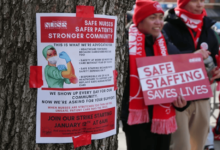Scottish virtual ward scheme ‘has saved millions for NHS’

A scheme in which nurses treat hospital patients at home has saved the Scottish NHS millions and helped avoid thousands of stays in a ward, according to a new report.
The health service in Scotland has been expanding its Hospital at Home programme, in which some older and acute patients are treated from home, as opposed to at an inpatient facility.
“Evidence shows that those benefitting from the service are more likely to avoid hospital or care home stays”
Neil Gray
Patients treated in this way have their case managed by a hospital “specialist”, and have care delivered in their home by a range of health professionals including nurses.
This week, Healthcare Improvement Scotland published a report into the performance, use and further development of the scheme across the country.
In 2023-24, 14,467 people used the Hospital at Home scheme rather than going into hospital, a 24% increase from 11,686 in the previous year.
This, the report estimated, saved the use of 570 hospital beds across Scotland, 430 care home places, £14.9 in hospital costs and £36.3m in outpatient and care home costs over the most recent financial year.
The number of Hospital at Home ‘beds’ increased by 58%, from 314 in quarter four of 2022-23 to 495 in quarter four of 2023-24 – ahead of the 50% expansion target.
From April 2023-March 2024, four new regions became covered by the Hospital at Home scheme: Dumfries, Galashiels, Lerwick and Oban and £3.6m in funding from the Scottish Government went towards increasing capacity.
Individual NHS organisations reported significant changes to the way they had operated.
At NHS Fife, the number of patients being cared for each month by the Hospital at Home service has steadily increased since 2021, according to the report.
For 2023-24, the organisation integrated district and community specialist nurses with the Hospital at Home service, to further streamline care for patients.
One (anonymous) patient under NHS Fife told the report: “I have had Hospital at Home nurses every day for a fortnight. Each one has been first class. Highly professional care with a friendly approach.”
Meanwhile, in the part of NHS Highland areas of the Isle of Skye and Caithness, the more sporadic patient load and extremely rural nature of the locality meant the Hospital at Home service made use of advanced nurse practitioners (ANPs).
NHS Lanarkshire, which also covers a very rural area, too used ANPs as part of its Hospital at Home service.
“We know that patients benefit from receiving safe, patient-centred care in the comfort of their own home”
Belinda Robertson
The report said the scheme in this region had, in the 2023-24 year, expanded into Clydesdale, using ANPs to help make sure those in harder-to-reach areas get “acute care at home” for conditions such as infections, pneumonia, heart failure, delirium, falls and others.
Speaking after the publication of the report, Scottish health secretary Neil Gray said he was “pleased” at the progress of the scheme, and particularly happy with the impact it had on elderly patients.
He said: “Hospital at Home allows patients to receive acute treatment in an environment that they feel comfortable and familiar with,” he added.
“There are more Hospital at Home beds for older people available and an increasing number of patients are choosing to use the service.
“Hospital at Home gives people greater independence during their recovery. Evidence shows that those benefitting from the service are more likely to avoid hospital or care home stays for up to six months after an acute illness.
“It is also one of a range of measures that we have put in place to tackle delayed discharge numbers and free up beds within our hospitals.”
For the 2024-25 financial year so far, the scheme has continued to expand. The Scottish Government stated that it had allocated £2.8m to 13 local health providers across the country,
Belinda Robertson, associate director of improvement for Healthcare Improvement Scotland, said: “We know that patients benefit from receiving safe, patient-centred care in the comfort of their own home whilst continuing to benefit from the support they are used to from families, friends and carers.
“Our latest annual report for Hospital at Home services across Scotland shows that more and more NHS boards and Health and Social Care Partnerships are providing acute hospital care to people in their own homes.”
She added: “We would like to commend the Hospital at Home services for the fantastic work they’ve done to establish and grow their services.”







